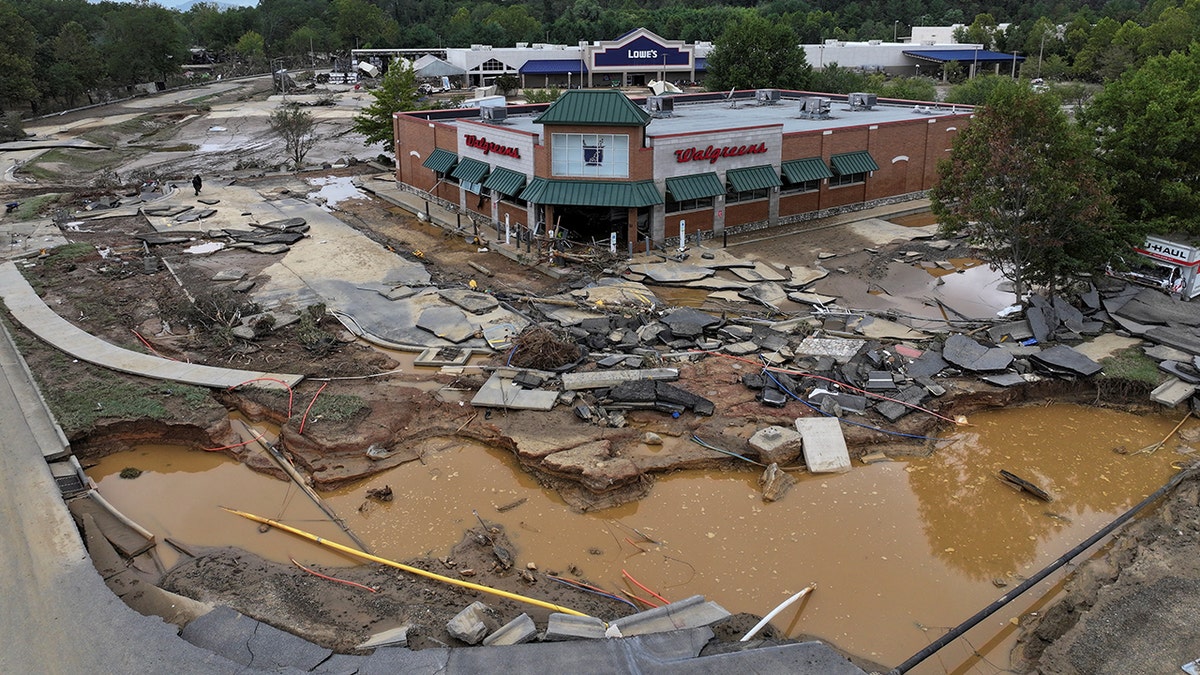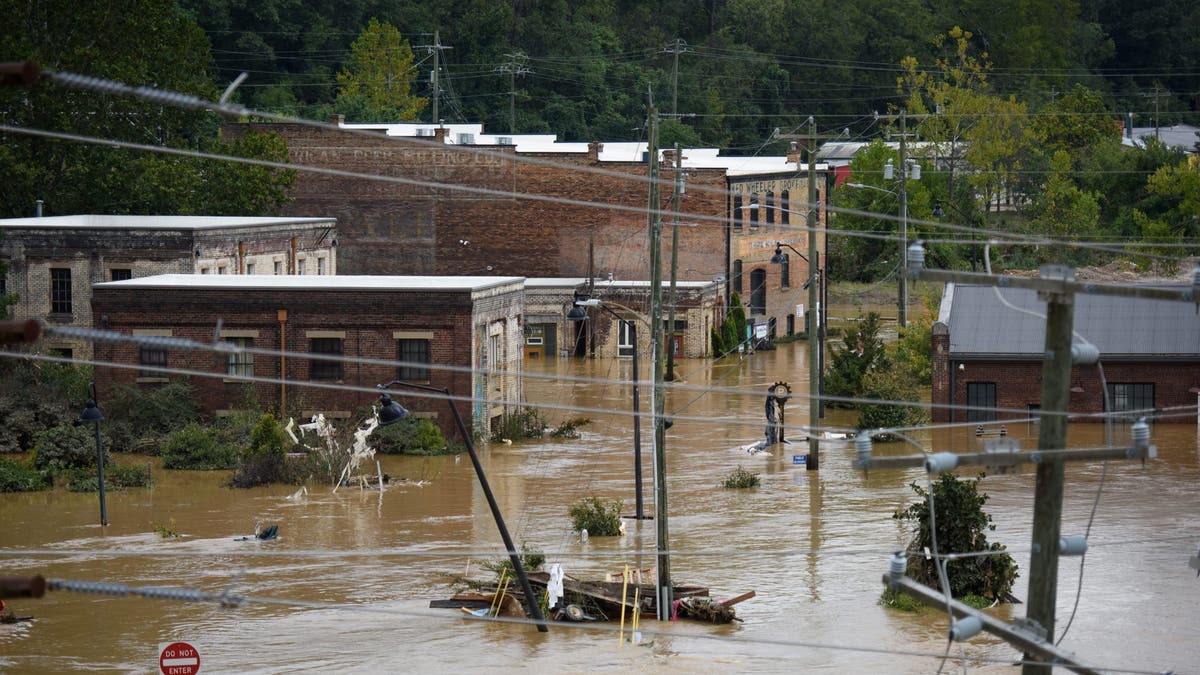In the early morning hours of Sept. 27, as Hurricane Helene descended over the Appalachian Mountains, Chris Griffin noticed a creek near his North Carolina home was higher than normal.
An hour later, cars were floating past his property in floodwaters, Griffin, 57, told Fox News Digital.
“The creek had come up real high and turned real red, and then the banks started sliding out and made a big pond. And then it broke loose and started taking trees and everything else out,” Griffin recalled.
Over the next 20 minutes, Griffin, who lives with his mother, would lose everything he and his mother had on 10 acres of land in Garren Creek, a neighborhood in Fairview outside Asheville, where 13 people, including 11 members of the same family, died in mudslides that same morning.
CAJUN NAVY BONDS WITH 140-YEAR-OLD ‘ANGEL’ IN NORTH CAROLINA MOUNTAINS AFTER HELENE
Chris Griffin lived in a tent for weeks after Hurricane Helene before local volunteers donated some temporary dwelling units to his family. (Steve Antle)

Griffin lost his house, vehicles and garage, along with all his personal belongings. (Steve Antle)
“I lost my house, my garage, all my vehicles,” he said. “We just barely got out.”
Griffin thought he’d lost his dog, too, who was in the house when water destroyed its foundation and carried it down river. By some miracle, his dog returned to their property the next day.
HURRICANE HELENE: MORE THAN 90 REPORTED DEAD IN NORTH CAROLINA, 10 UNACCOUNTED FOR

Griffin thought he’d lost his dog, too, who was in the house when water destroyed its foundation and carried it down river. His dog returned to the property the next day. (Steve Antle)
The storm also unearthed his father’s grave. His father’s casket floated downstream and remained above ground for about two weeks before Griffin and his sons reburied it. They were also able to flip his headstone, which was dislodged during the storm, back in its upright position. Griffin’s father had been buried about two years.
“We had to fill it back in, and we got the headstone,” Griffin said, adding that seeing the damage to his father’s grave was “pretty disturbing.”

The storm also unearthed his father’s grave. His father’s casket floated downstream and remained above ground for about two weeks before Griffin and his sons reburied it. (Steve Antle)
For weeks, Griffin was sleeping in a tent on his property while he worked to clear debris and clean up damage to his property. Recently, local volunteers donated and delivered a yurt, a camper and a shed-like building for Griffin and his family — including his mother, sister and his sister’s children — to live in while he tries to clear debris from his property and get situated before temperatures, which have already dropped to the 30s at night, get even colder as winter approaches the mountains.
He said a group from Alabama helped him “dig out the creek” on his property, and electricians came and set up a generator.
NORTH CAROLINA HELENE VICTIMS ‘LEFT BEHIND’ GET HELP FROM STAR-STUDDED CONCERT FOR CAROLINA

Volunteers donated and delivered a yurt, a camper and a shed-like building for Griffin and his family, including his mother, sister and his sister’s children, to live in while he tries to clear debris from his property and get situated before temperatures drop. (Steve Antle)
The Garren Creek community also assisted with clearing trees on roads to make them accessible for travel and cleaning debris still piled up for miles after the hurricane brought mudslides to the area. Griffin said everything is heavy with dried-up mud.
“We’re just trying to pick up the pieces and get my mom straightened back out,” he said. “We haven’t had any real help. … None of the government has come down to help us. Just volunteers.”

Local volunteers have been helping Griffin clear debris around his property after Helene. (Steve Antle)
FEMA said in an Oct. 24 press release that it is “currently offering temporary housing to those in need in 25 counties across western North Carolina that are “tailored to meet each household’s individual needs,” but the agency notes on its website that setting up such housing “will take time” and is “not intended as an immediate solution for a survivor’s shorter-term housing needs.”
For those who need immediate shelter, FEMA says “financial assistance is available, including temporary lodging reimbursement, FEMA-provided hotel or motel stays or help with rent.”

A drone view shows damage from Hurricane Helene in Asheville, N.C., Sept. 29. (Reuters/Marco Bello)
“Everybody lost everything. Nobody’s got any money,” Griffin said, adding he lost his own money that was in a safe during the hurricane. “We’re just kind of starting here from scratch. People are trying to give you campers and stuff, but you’ve got to pay for them after so long. People around here, they ain’t got money trying to buy something because they’re going to redo everything, and they’re still trying to catch up on their bills from the month before.”
Griffin believes it will take a few years, at least, to rebuild what he had before the storm. Meanwhile, authorities are still looking for missing people.

Heavy rains from Hurricane Helene caused record flooding and damage Sept. 28, 2024, in Asheville, N.C. (Melissa Sue Gerrits/Getty Images)
CLICK HERE TO GET THE FOX NEWS APP
“There’s so many others that ain’t got anywhere to go now because everything’s gone. Nobody’s got vehicles,” he said. “We just need more resources … to come in and help us rebuild. We need more help than just the volunteers. I mean, they’re trying to do all they can, but they can only stay for so long.”
Helene left at least 227 people dead across the Southeast, including 99 people in North Carolina. North Carolina Gov. Roy Cooper estimates Helene caused approximately $53 billion in damage in the state.





